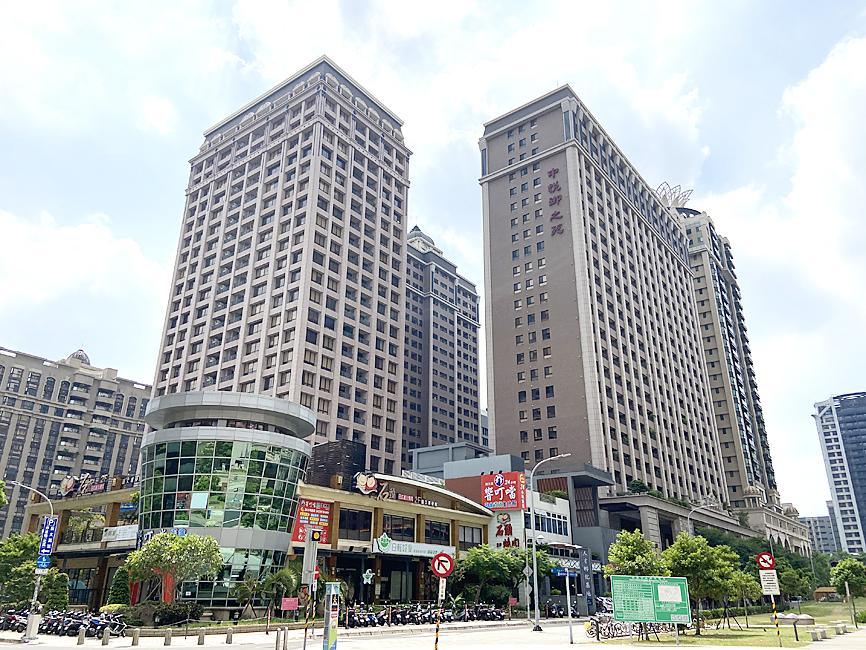The housing market in northern Taiwan remained sluggish last month, a survey released on Thursday last week by Chinese-language My Housing Monthly showed.
The housing index compiled by the magazine fell three points from a month earlier to 33.7, but remained in the “yellow-blue” category, which is from 32 to 42 points, for the 12th consecutive month, it said.
Under My Housing Monthly’s color-coded system, “red” indicates overheating, “yellow-red” shows fast growth, “green” represents stable growth, “yellow-blue” signals sluggish growth and “blue” indicates contraction.

Photo: Hsu Yi-ping, Taipei Times
The index covers major counties and cities in northern Taiwan — such as Taipei, New Taipei City, Keelung and Taoyuan, and Hsinchu and Yilan counties — which accounts for more than 50 percent of total residential and commercial property transactions in the country.
Ho Shih-chang (何世昌), a research manager at the magazine, said the decline largely reflected fragile confidence among property developers and real-estate firms, which led to a decline in the amount of property put up for sale last month, a traditional slow season.
However, buyers with real demand still purchased property, lending some support to the entire market in the month, Ho said.
Among the six factors in the index, the sub-indices for listings of new residential property projects, listings of newly built residential properties and housing advertising volume fell to 6.90, 2.76 and 3.28 respectively, from 7.99, 4.44 and 3.88 a month earlier, the survey showed.
Amid cautious sentiment among developers, new residential property listings in northern Taiwan totaled about NT$30 billion (US$1.06 billion) last month, down from about NT$50 billion in January, Ho said.
Bucking the downturn, the sub-index on home price negotiations rose to 8.21 from January’s 7.86, the survey showed.
The sub-indices on visits to properties by potential buyers and total transactions remained unchanged at 6.92 and 5.63 respectively, the poll showed.
The survey was conducted before the government unveiled its latest measures to rein in speculation in the property market.
The Executive Yuan on Thursday last week approved a draft amendment to the Income Tax Act (所得稅法), imposing heavier taxes on property sellers for transactions if they sell property within a fixed period.

KEEPING UP: The acquisition of a cleanroom in Taiwan would enable Micron to increase production in a market where demand continues to outpace supply, a Micron official said Micron Technology Inc has signed a letter of intent to buy a fabrication site in Taiwan from Powerchip Semiconductor Manufacturing Corp (力積電) for US$1.8 billion to expand its production of memory chips. Micron would take control of the P5 site in Miaoli County’s Tongluo Township (銅鑼) and plans to ramp up DRAM production in phases after the transaction closes in the second quarter, the company said in a statement on Saturday. The acquisition includes an existing 12 inch fab cleanroom of 27,871m2 and would further position Micron to address growing global demand for memory solutions, the company said. Micron expects the transaction to

Vincent Wei led fellow Singaporean farmers around an empty Malaysian plot, laying out plans for a greenhouse and rows of leafy vegetables. What he pitched was not just space for crops, but a lifeline for growers struggling to make ends meet in a city-state with high prices and little vacant land. The future agriculture hub is part of a joint special economic zone launched last year by the two neighbors, expected to cost US$123 million and produce 10,000 tonnes of fresh produce annually. It is attracting Singaporean farmers with promises of cheaper land, labor and energy just over the border.

US actor Matthew McConaughey has filed recordings of his image and voice with US patent authorities to protect them from unauthorized usage by artificial intelligence (AI) platforms, a representative said earlier this week. Several video clips and audio recordings were registered by the commercial arm of the Just Keep Livin’ Foundation, a non-profit created by the Oscar-winning actor and his wife, Camila, according to the US Patent and Trademark Office database. Many artists are increasingly concerned about the uncontrolled use of their image via generative AI since the rollout of ChatGPT and other AI-powered tools. Several US states have adopted

A proposed billionaires’ tax in California has ignited a political uproar in Silicon Valley, with tech titans threatening to leave the state while California Governor Gavin Newsom of the Democratic Party maneuvers to defeat a levy that he fears would lead to an exodus of wealth. A technology mecca, California has more billionaires than any other US state — a few hundred, by some estimates. About half its personal income tax revenue, a financial backbone in the nearly US$350 billion budget, comes from the top 1 percent of earners. A large healthcare union is attempting to place a proposal before